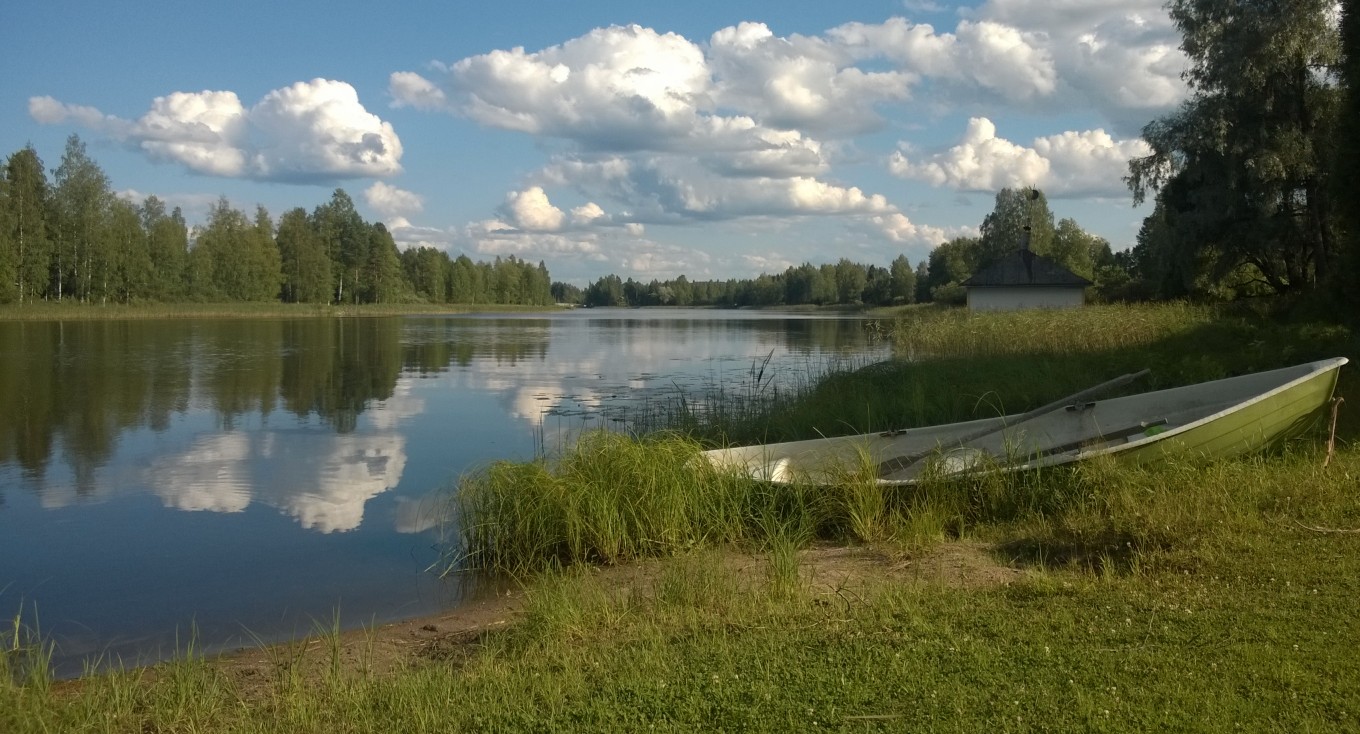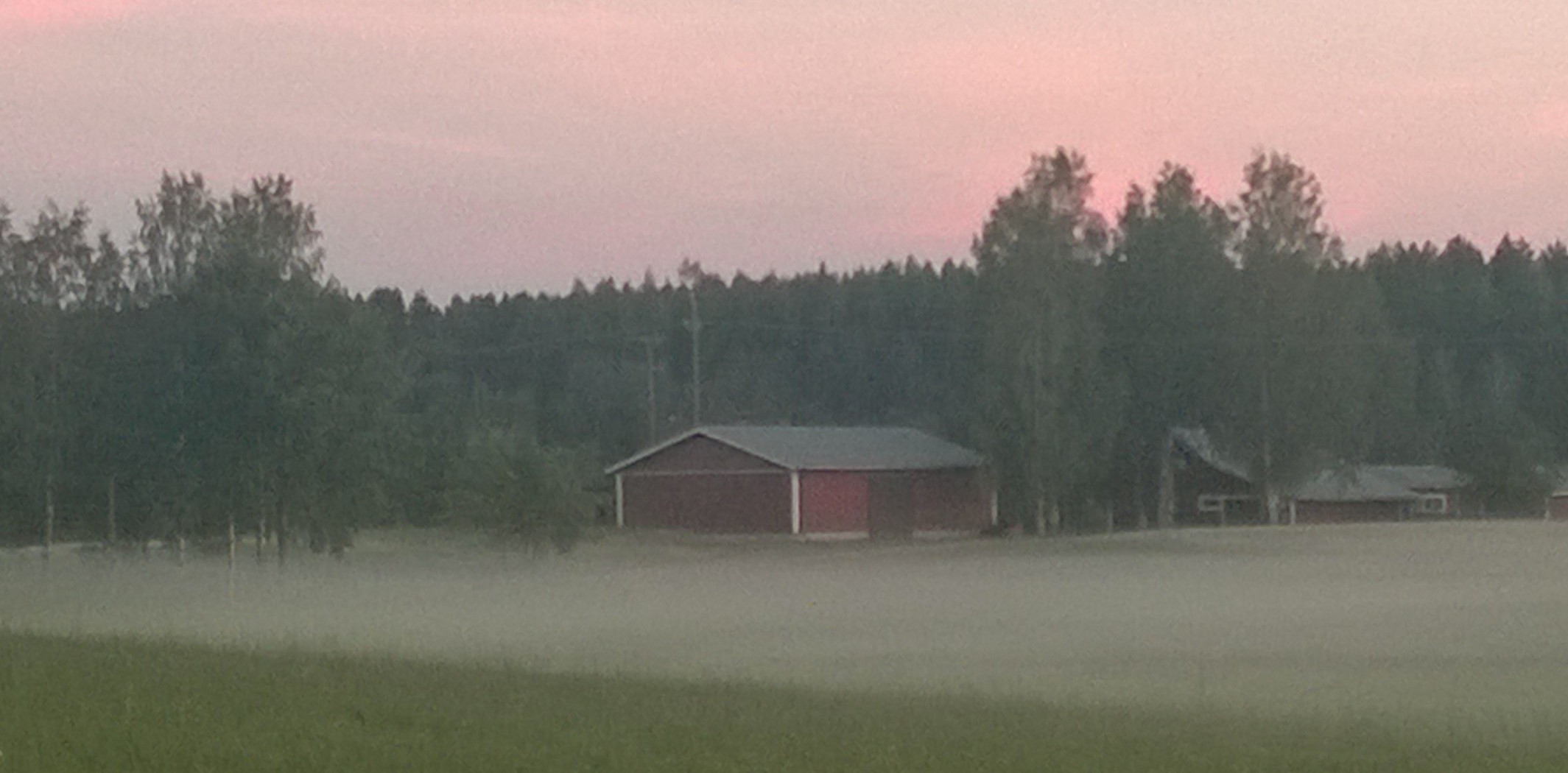It’s been decades since I’m bothering my friends with the preach that, in a clever society, some rudiments of thermodynamics should be taught in mandatory elementary school, for reasons not solely environmental but also economical. Unfortunately, very few of us are aware of how many resources (directly translatable to money, for those who don’t care about sustainability) are lost only because of our ignorance about heat transmission processes.
This digression–apparently out of place in a journey account–has come to my mind after visiting my friend Jussi in Kuru (about fifty kilometres north of Tampere), where his house is placed; a house designed and built by himself with criteria equally practical, aesthetical and of energy optimization, specially stressing on insulation and other measures for minimizing thermical losses; and the results are amazing: e
it keeps a uniform temperature with only slight daily or seasonal fluctuations, needing minimal heating or cooling input; which allows him to save–besides time and trouble–quite a bit of money in air conditioning costs and expenses–not to talk about optimizing his carbon footprint.
But housing is not the only way how thermodynamics knowledge can prove useful for more kindly treating ourselves, our budget and our badly injured planet; there are many other instances in life where, knowing how heat transmission works (“cold” doesn’t exist in thermodynamics: it’s only the absence of heat), could yield quite practical results.
Thanks to energy optimization, for instance, along the 5,000 km that I’m so far riding, this journey, a motorcycle with the best mechanical output in the market, I’ve ceased to release some 200 kg of CO2, which amounts to 110 m³ less emissions than with any other comparable bike; and this translates, on the other hand, to around a 135 € saving. Not a fortune, but it’s always a plus to know that, besides minimizing environmental impact, one saves up some money.
What I’m trying to convey can also be into different words: environmentalism is cheap. By the way, the day I stayed at Jussi’s he instructed me in an ingenious heating system becoming popular of late in Finland (viable only in cold regions), based on profiting from the subsoil’s higher temperatures, fifty to one hundred metres deep, pumped to the homes. But I won’t digress on this here.
* * *
It’s a warm fine morning when I say farewell to my friend, get astride Rosaura and carry on my journey, knowing not where to go; though I’m not as lost as two weeks ago, because for a few days now I’m thinking on maybe going to the mythical Nordkapp, presumedly the northernmost tip of Europe, in Norway. It’s just a vague idea for now, not even a project; I’m not quite sure if I want to aim that target, if it’s worth the trouble, ignoring how I do whether or not such place offers the visitor something beyond the bare myth, the achievement of a goal with no other purpose than itself. Reaching Cape North (or any other place, for that matter) having nothing whatsoever to do there, isn’t it absurd, as if turning means into ends? Yet, I somehow feel that having some destination, however absurd, puts some meaning into my meaningless roaming; it seems to lend some light to my dawns, or provide me with some motivation that I otherwise lack. Well, maybe it’s just a self-delusion, but then again, provided it works and helps me to go on, who cares?
However it be, remote and lonely places have always called me; so, I have to keep going up towards Lapland. But I don’t head right North from here, as it would take me across Finland’s most deadly boring part–or so Andrej says; instead I go northeastwards, which isn’t so easy a course because it cuts across the here geological prevailing structures that force a slant (like the Windows backslash \) on the lakes, ridges, valleys and roads. This way, from Kuru I first ride to Keuruu and then, getting deeper into the lake region of this country of lakes, and picking the route at every crossing, I pass through stimulating landscapes and little towns like Uurainen and Konnevesi, thus avoiding the city of Jyväskylä, these days hosting the Neste Oil Rally that’s stirring up this region’s life and keeps the lodgings and hotels fully booked.
Eventually, after more than two hundred kilometres’ day’s journey–quite a long one for me, as I like to stop often and get to know as close as reasonable those places where I go by–I come to Rautalampi, where my smartphone says there’s a countryside youth hostel named Korholan Kartano, one kilometre away along a dirt road. It’s a country house with three quarters, one if which looks quite rustic–undoubtedly a refurbished old barn or stable; the three of them sit around a large garden with grass, wooden tables and benches, a marquee and a twin swing. As I see some people around dressed quite fashionably, getting in and out the houses or sitting at the benches, I reckon a wedding is going on, or something of the like.
Parking the bike outside I cross the gate, but nobody addresses me; they seem to not even notice my presence. Shyly I come into what seems to be the main house, yet no one hampers my reaching the kitchen, where I still pass unnoticed. I know not whom to address. Some of them look like guests, some don’t, but it’s hard to tell; so, I go back outside and place a phonecall, upon which the landlady picks the phone. Is that a hostel, do you have vacancies?, I ask. She says yes, what time are you coming? I reply I’m already here, just outside; then she laughs and comes to pick me up.
She’s a serviceable and kind lady, who showes me the room–a rustic dorm in the oldest quarters, yet sufficiently refurbished for my needs–while telling me that there’s indeed a wedding going on, and suggests me to stay for listening to the music, supposedly worth the while. Also invites me to go into the kitchen once the guests leave and treat myself to some tea and a piece of cake, or any leftovers. It feels nice being dealed with so trustfully despite being a foreigner; yet I have some qualms about sneaking in a wedding and, besides, I want to explore the town and buy some supplies. So, bringing the bike inside the fence, I unload the side cases, take them to the dorm (where I’m the only guest), put on my sneakers and go to take a look around the premises. Behind the quarters there’s a small lake and, by its shore, the matter-of-fact sauna hut beside a small jetty. There’s also a boat run aground the beach which makes for a pretty postcard’s photo. You needn’t be any good with the camera for taking beautiful shots in Finland: pictures jump straight to your lenses.
Pity these hot days aren’t sauna-enticing! Instead, I lay on the grass and drowse for a while under the weaker, setting sun. When I come back to the garden, the wedding’s guests are all inside one of the houses, whence some chords can be heard; but I make up my mind to take a stroll towards the village.
Some twenty minutes later I’m walking along Rautalampi’s main street, which is actually the main road. I like it here. This is one of those many small Finnish towns that apparently don’t need lots of people for having some atmosphere. There are half a dozen pubs, cafes or restaurants, plus two supermarkets servicing the area, I guess. So, as I also like the accommodation, I decide to stay a couple of days instead of just one.
By the way, right before dusk on my second day, as I was again walking the path from the hostel to downtown, up an adjoining field there came a ghastly fog that left me openmouthed: it condensed in a few minutes as if the spigot of some liquid nitrogen tank had been torn open, the gas filled the lowland swallowing up the landscape before my very eyes. Perhaps there was a witches’ Sabbath going on and they wanted to hide themselves. Before I could even realize, the lower trees and a house were submerged within this surreal lake of condensed vapour, and sortly afterwards I stopped seeing anything, because I was myself within it, the fog having swallowed me too.
That evening I found that in one of Rautalampi’s pubs there was a karaoke, which Finns are very fond of. Without hesitating I came in, grabbed a beer and sat in a corner, where I stayed for a good while amusing myself watching the atmosphere. In these scarcely populated regions it’s usually some traveling entertainer who brings his mobile karaoke to the small towns, a place at a time, which doesn’t take much more than a computer, a good collection of songs+lyrics, and basic sound equipment. And I like to think how locals are happy with that simple, countryside life of theirs, needing no more than a few easy things to be pleased and merry; how joyfully they partake in such small events, apparently not missing the hustle and bustle of the big cities… And of course I love to share this harmony they seem to live in.



